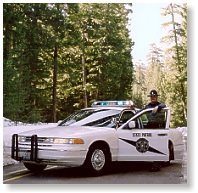
The Washington Supreme Court addresses the admissibility of sound and video recordings made during traffic stops. The case involves four consolidated cases, with drivers who were prosecuted for DUI offenses. Lewis v. State, --- P.3d ---, --- Wash. 2d ---, 2006 WL 2237888 (Aug. 3, 2006).
(There were two court of appeals cases on the way up, each dealing with two drivers: Lewis v. State, 125 Wash. App. 666, 105 P.3d 1029 (2005); City of Auburn v. Kelly, 127 Wash. App. 54, 111 P.3d 1213 (2005).)
First the Court considers whether the conversations were "private" and hence covered by the privacy act, RCW 9.73.030, which requires consent for recording private conversations. Justice Fairhurst, writing for a unanimous court, says no.
Next the Court looks at RCW 9.73.090, which includes:
A law enforcement officer shall inform any person being recorded by sound under this subsection (1)(c) that a sound recording is being made and the statement so informing the person shall be included in the sound recording, except that the law enforcement officer is not required to inform the person being recorded if the person is being recorded under exigent circumstances.After reviewing the legislative history, the Court finds that the drivers must be notified of the recording.
Next, there's the question of remedy, and the Court holds that the appropriate remedy when a subject is not notified of the recording is to exclude it as evidence. So the cases are remanded. In one the recording will be admissible, because the driver was told the conversation was being "recorded" (even though the officer did not specify it was a "sound recording"). In the other three, the recordings will be excluded.
Photo: Washington State Patrol trooper at Mt. Rainier, from WSP.
Filed in: cases, DUI, recordings, evidence, traffic-stops, privacy, Fairhurst

No comments:
Post a Comment